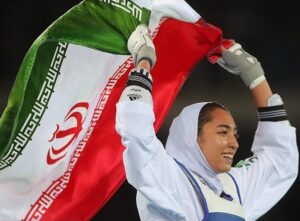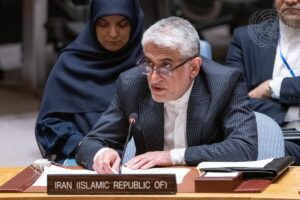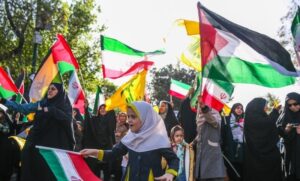Thank you, Chairman Grothman, Ranking member Garcia, and other distinguished members of this subcommittee for giving me the opportunity to discuss U.S. policy toward Iran.
When it comes to Iran, there are no “perfect” deals and no easy choices. However, the agreement that was reached to free five American citizens held unjustly in Iran has been painstakingly choreographed to the maximum advantage of the United States.
Some $6 billion in Iranian oil revenues that have been frozen for many years in South Korea are being transferred via Switzerland to two Qatari banks. There, the money will be available for the carefully monitored purchase of humanitarian goods and services by Iran. Iranian officials and government-owned media insist they will be able to spend the money as they like, but that’s a lie. I’ve been amused frankly to listen to opponents of the deal quote Iranian sources that they previously discounted as somehow credible now.
This is not a “ransom” and it is not “appeasement.” Indeed, one could argue that these funds were frozen illegally as a result of the Trump administration’s violation of an internationally approved agreement — the 2015 Joint Comprehensive Plan of Action. This traded strict curbs on Iran’s nuclear program for an end to multilateral sanctions on its oil industry and other key sectors.
Iran waited a year after Trump’s withdrawal in 2018 before it began to exceed the limits set under the JCPOA. It has now gone very very far. According to the latest IAEA report, while Iran has slowed its accumulation of uranium enriched to 60 percent, it has more than 3000 kilograms of enriched uranium — 10 times that allowed under the JCPOA, which limited Iran to 300 kilograms of low enriched uranium. Iran now has 500 kilograms of 20 percent uranium and more than 120 kilograms of 60 percent uranium. None of this would exist if Trump had not violated American commitments and incentivized Iran through a “maximum pressure” strategy that has patently failed.
His rejection of the JCPOA while it was being implemented by Iran also discredited the supporters of the deal in Iran and led to their marginalization in the Iranian political system. You may not have liked Hassan Rouhani, but he was much more supportive of diplomacy with the West than the current Iranian president, Ebrahim Raisi. Deprived of Western markets for its oil, Iran has put all its eggs in a Chinese basket and strengthened its military alliance with Russia. That is hardly in US national interests. At the same time, Iran has stepped up its domestic repression in the wake of the death of Mahsa Amini in police custody a year ago, which sparked nationwide protests. And it has continued the awful practice of taking foreign hostages.
I am old enough to have lived through — indeed covered from afar as a journalist — the first hostage crisis with the US in 1979. Since Iran held 52 American diplomats hostage for 444 days, it has, despicably, resorted to this tactic from time to time — especially since the U.S. withdrawal from the JCPOA. The fact that so many Iranians in the United States continue to travel to Iran to see family has made them an easy target. The regime has also historically gone after dual nationals who have promoted better relations with the United States; I’m thinking here of Siamak Namazi, who has been held for almost eight years on sham charges, and my mentor, Haleh Esfandiari of the Wilson Center, who was held in Evin Prison for four months in 2007.
The other witnesses you have heard from today have argued that we should never give in to blackmail and that allowing Iran access — even to its own money — will only encourage the government to take more hostages. Sadly, I don’t think Tehran needs encouragement. It takes hostages for a variety of reasons — to intimidate Iranians inside the country and in the diaspora not to get involved in opposition politics, to obtain pawns to trade for Iranians arrested abroad and sometimes as pure extortion — to seize property in Iran owned by dual nationals. If there were a magic way to stop this practice, that would be great. But there isn’t. It has gone on under Democrats and under Republicans.
The Biden administration — indeed any administration — has a choice: negotiate for the release of detained Americans or let them rot in jail. It is the duty of US governments to free Americans unjustly held abroad, whether in Russia or China or Cuba or North Korea.
The five Americans currently under “hotel arrest” in Tehran deserve their freedom. This agreement will achieve that. Iran will be paid with its own money, which it will have to spend on food and medicine — items that have never been subjected to U.S. sanctions.
For those who supported Trump’s policy of “maximum pressure” to complain about this agreement is the height of chutzpah. Their policy has patently failed by every measure. More of the same is not going to yield better results.
It is unpleasant to negotiate with governments like Iran’s. But often, there is no alternative. I am reminded of a favorite quotation of former Deputy Secretary of State Richard Armitage: “diplomacy,” he would say, “is the art of letting the other guy have our way.”
Indeed, diplomacy is the only thing that has ever worked in terms of curbing Iran’s nuclear ambitions.
It’s easy to say you won’t talk to someone but that also means that you have deprived yourself of the possibility for positive results. I’m thinking now of a former member of the House, former governor and UN ambassador, Bill Richardson, who passed away recently. As you know, he made a profession and an art of freeing Americans held abroad. After he died, his partner, Mickey Bergman said, “There was no person that Governor Richardson would not speak with if it held the promise of returning a person to freedom.”
The Biden administration owes no less to Siamak Namazi, Emad Sharghi and Morad Tahbaz, as well as two other Americans whose names have not yet been released.
When they finally land on U.S. soil, all Americans should cheer. There are no Republican or Democratic hostages, there are only Americans.
I thank you for your attention and look forward to your questions.
Barbara Slavin is a Distinguished Fellow at the Stimson Center and the director of the Middle East Voices project.



